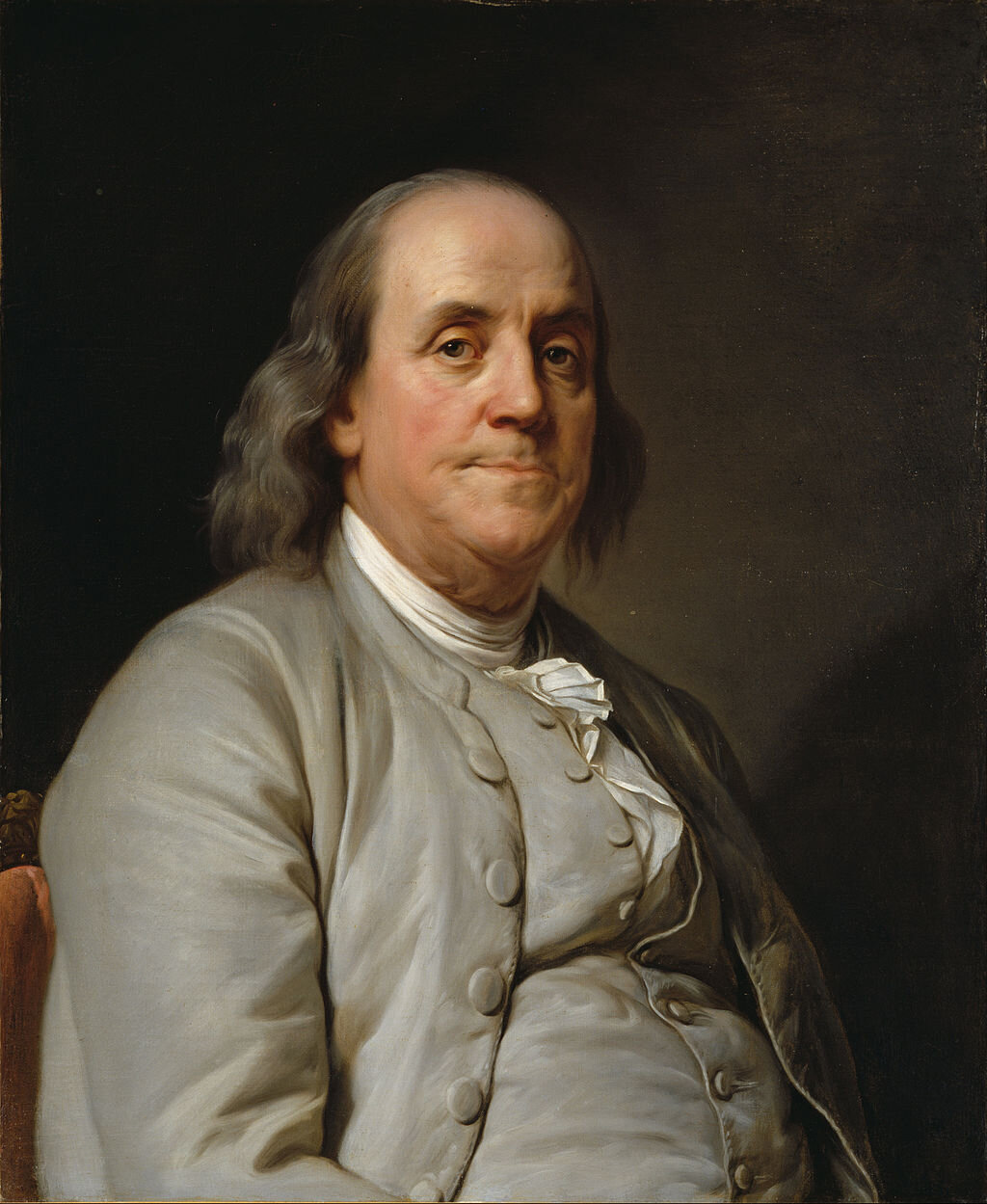
Benjamin Franklin
Pennsylvania
Benjamin Franklin’s life, in one way, can be characterized by the extremes he experienced throughout his life. He was born in the heartbeat of the American Revolution: Boston, Massachusetts on January 17, 1706. In his youth, he despised his education. (He only had two years of formal schooling.) And yet, he possessed a mastery of education’s pillars: reading, writing, and arithmetic; as evidenced by his life’s accomplishments. For example, he conquered the printing business and publishing world and hence retired from it at the age of 42. Amongst his numerous publications, Poor Richard’s Almanac is one standout. This is where he deposited proverbial gems such as, “Good sense is a thing all need, few have, and none think they lack.” Another colossal publishing success is The Pennsylvania Gazette, which is still in publication after 294 years.
As well, his writings on science were translated into French, German, and Italian. And his inventions (the lightening rod, glass armonica, the battery, the bifocal, and more) are ample evidence of a man possessing significant intellect. He would, eventually, receive honorary doctoral degrees from the Universities of Yale, Edinburgh, Oxford, and other prestigious institutions. Finally, he was the founder of the American Philosophical Society, which is based on the Royal Society in London.
In 1739, Benjamin Franklin became the friends with the 18th century’s most known itinerant preacher, George Whitefield. It was a curious friendship for Franklin was a Deist philosophically and non-religious culturally. When Dr. Franklin was establishing the academic roots of the University of Pennsylvania, he consulted Rev. Whitefield about his endeavors. Whitefield was quite supportive and excited about the establishment of a school for higher learning, but he did believe it lacked an integrated Christian framework. He wrote:
It is true you say, ‘The youth are to be taught some public religion, and the excellency of the Christian religion in particular;’ but methinks this is mentioned too late, and too soon passed over. … it is reasonable to suppose that the grand end of every Christian institution for forming tender minds should be to convince them of their natural depravity, of the means of recovering out of it, and of the necessity of preparing for the enjoyment of the Supreme Being in a future state. … I wish you and the gentlemen concerned much prosperity … to promote the best end; I mean the glory of God and the welfare of your fellow-creatures.
Dr. Franklin declined his friend’s advice and established the school with no formal religious affiliation. Later, ironically, during the Constitutional Convention, he was rebuffed when he encouraged his fellow delegates to begin every day with a minister praying for the “assistance of Heaven” to fall on the assembly. He made this motion in light of some gridlock stalling progress toward a written framework for the infant nation. Dr. Franklin encouraged those present to ask for a reverend to come to the hall and pray for wisdom and progress on a daily. His suggestion was denied.
There were times in Dr. Franklin’s life where he was most beloved by his fellow colonists and at other times, his loyalty to the cause of freedom was questioned. While representing the colonies’ interests in London, he thought it unlikely to stop the passage of the Stamp Act. Instead, his strategy was to push to repeal it once enacted. This approach was misconstrued back home and endangered his reputation as well as the safety of his family. When news of his advocacy during the debates regarding repeal reached the shores of America, support and acclaim returned. Through the experience, his faith in the crown and Parliament waned and his “Americanness,” as he termed it, filled his breast like never before.
In July 1776, Benjamin Franklin voted for independence and signed the Declaration. He was the oldest person to add his name to the document in the newborn nation. It is only his signature that is affixed to all four founding documents of America. The others are the Treaty of Alliance with France, the Treaty of Paris, and the Constitution of the United States.
In December of the same year, Dr. Franklin was sent to France to conduct diplomacy and secure a partner in trade and in the war effort. The most famous American arrived in France and quickly saw his popularity was quite high. His image was found on tea cups, snuffboxes, on rings and statues, and other sundry items. He used the French’s fascination with himself as way to accentuate his mystique with the court of King Louis XVI. To the most formal court in Europe, he would wear a brown and white linen suit with a fur cap sans traditional wig and sword. His American eccentricity and diplomatic congeniality secured a $2 million loan, terms of trade and commerce, and an alliance that assured the mutual military assistance to the other against their common enemy, Great Britain.
After negotiating the Treaty of Paris in 1783, which ended the Revolutionary War, Benjamin Franklin returned home to America and experienced his final extreme. He should have been loved and honored for his critical work in France, but few national leaders put out the welcome mat for him. He was accused of being a Francophile and stories of his sordid lifestyle abroad sullied his reputation. He petitioned Congress for some land on the western frontier. The answer was not no. There was no answer. In hopes of receiving some acknowledgment for his diplomatic efforts, Dr. Franklin then submitted a formal memo of his services to the United States. Once again, Congress ignored it. He retaliated by signing a petition to abolish slavery. The pro-slavery block in Congress defended the institution with vigor and a “touch” of rage. He would later mock them in the newspapers.
Benjamin Franklin served his state, one last time, at the Constitutional Convention (1787-89) and as president (governor) of Pennsylvania for two terms. He died on April 17,1790. 20,000 mourners honored Dr. Franklin at his funeral service in Philadelphia.
Several decades before his death, in his star publication, he had shared this bit of wisdom, “The noblest question in the world is, ‘What good may I do in it?’” His life answered Poor Richard’s question.
Benjamin Franklin live to be 84 years of age.


